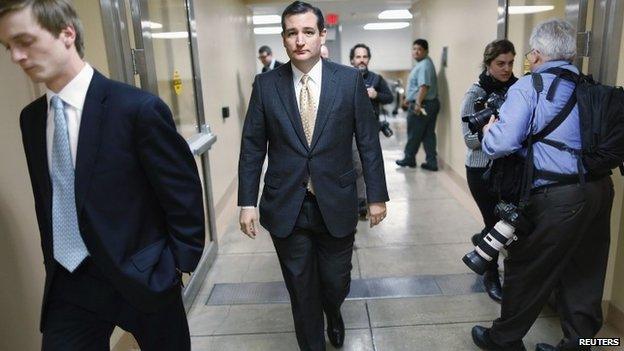Senate passes bill raising US debt limit
- Published

Texas Republican Senator Ted Cruz was among the Republicans who opposed raising the debt limit
The US Senate has sent to the president a bill to raise the country's borrowing limit for another year, ending a series of political standoffs over the issue.
The chamber passed the bill on a 55-43 party line vote a day after it narrowly passed the House of Representatives.
US officials had warned of a possible default at the end of the month if Congress did not act.
The move came after Republicans gave up on their attempt to win concessions in return for raising the limit.
The measure now goes to President Barack Obama to sign into law.
"I'm pleased that Republicans and Democrats in Congress have come together to pay for what they've already spent, and remove the threat of default from our economy once and for all," Mr Obama said in a statement on Wednesday.
"Hopefully, this puts an end to politics by brinksmanship and allows us to move forward to do more to create good jobs and strengthen the economy."
Warning of calamity
The bill will waive the $17.2tn (£10.4tn) debt limit until 15 March 2015, enabling the US government to borrow money to fund its budget obligations and debt service.
The White House, the IMF, and most mainstream economists had warned of calamity if the US defaulted on its public debt.
All of the aye votes in the 55-43 Senate count came from Mr Obama's Democrats, who hold the majority in the chamber.
On Tuesday, the Republican-controlled House of Representatives passed the bill 221-201, with only 28 Republicans voting in the affirmative.
'Clean' bill demand
Most Republicans in the House and Senate opposed raising the debt limit without concessions from the Democrats, arguing a debt ceiling increase encouraged what they describe as profligate government spending.
In the current and past debt limit fights, the Republican Party's wish-list has included extensive budget cuts, measures that would repeal or undermine Mr Obama's signature healthcare reform, a proposal to force Mr Obama to approve the Keystone XL oil pipeline from Canada, a repeal of recent cuts to pensions for working-age military retirees, and more.
As in the last major Washington DC budget brawl, in September and October, Mr Obama and the Democrats said they would refuse to negotiate over the borrowing limit, arguing raising the limit amounted to the US government making good on spending it had already undertaken.
They demanded a "clean" bill that would raise the debt ceiling without enacting additional policy measures.
- Published12 February 2014
- Published12 February 2014
- Published3 October 2013
- Published3 February 2014